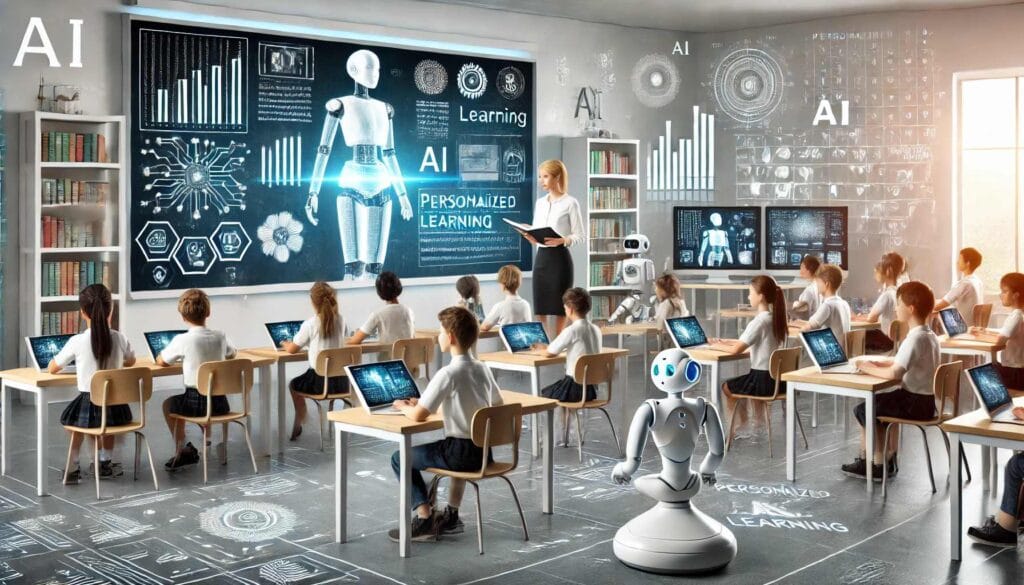The Impact of AI on Education: Transforming the Way We Learn

Artificial Intelligence (AI) is revolutionizing various sectors, and one of the most significant areas of transformation is education. From personalized learning experiences to automating administrative tasks, AI has both promising benefits and challenges that are reshaping how we think about teaching and learning.
1. Personalized Learning
One of the most profound impacts of AI in education is the ability to create personalized learning paths for students. AI-powered algorithms analyze students’ learning styles, strengths, and weaknesses to customize educational content. This ensures that each student can learn at their own pace, with material suited to their individual needs.
- Adaptive Learning Systems: Platforms like Carnegie Learning and Knewton provide adaptive learning technologies that continuously assess student performance and adjust lesson plans accordingly.
- Benefits: Improved engagement, better knowledge retention, and a more student-centric approach to education.
2. Intelligent Tutoring Systems
AI tutors can provide additional support outside of the classroom, offering explanations, answering questions, and guiding students through complex subjects. While these systems cannot fully replace human teachers, they provide valuable supplemental support, especially for students who need extra help.
- Examples: Systems like MATHia and Squirrel AI are designed to help students improve in subjects like math and science.
- Limitations: While effective, these systems may lack the empathy and understanding of a human teacher.
3. Automated Administrative Tasks
AI can automate many of the administrative responsibilities teachers face, such as grading assignments, managing schedules, and even providing feedback on essays. This allows educators to focus more on teaching and less on paperwork.
- Efficiency: Automating grading saves time and provides immediate feedback to students.
- Concerns: The risk of errors and the challenge of ensuring fairness and impartiality in AI grading systems.
4. Enhancing Accessibility
AI technologies have the potential to make education more accessible to students with disabilities. Tools like speech recognition, text-to-speech, and real-time translation can assist students who face barriers to learning.
- Voice Assistants: AI-driven voice assistants like Siri and Alexa can help students with visual or physical impairments access information and complete tasks.
- Text-to-Speech Software: Applications such as NaturalReader make content accessible for students with reading difficulties.
5. Language Learning and Translation
AI-powered language learning apps, such as Duolingo and Rosetta Stone, use natural language processing (NLP) to provide instant feedback on pronunciation and grammar. AI can also offer real-time translation services, breaking down language barriers in global classrooms.
- Global Learning: Real-time translation allows students from different parts of the world to collaborate and learn together.
- Limitations: The nuances of human language, such as cultural context, may not always be captured accurately.
6. Data-Driven Insights for Educators
AI systems can analyze vast amounts of educational data to provide insights into student performance and curriculum effectiveness. Teachers can use these insights to identify areas where students are struggling and to refine their teaching methods.
- Early Intervention: Predictive analytics can identify at-risk students, allowing for timely intervention.
- Customized Curricula: Educators can adjust their lesson plans based on data-driven insights to improve learning outcomes.
7. Challenges and Ethical Concerns
Despite the many benefits of AI in education, there are also significant challenges and ethical concerns that must be addressed.
- Data Privacy: The collection and analysis of student data raise concerns about privacy and the potential misuse of sensitive information.
- Equity: Access to AI-powered educational tools may not be equal for all students, particularly in underfunded schools or developing countries.
- Job Security for Educators: There is a fear that AI could replace certain teaching roles, although most experts agree that AI is more likely to augment rather than replace teachers.
8. The Future of AI in Education
As AI technology continues to evolve, it will likely become an even more integral part of the educational landscape. Future advancements may include fully immersive virtual classrooms powered by AI and more sophisticated emotional recognition technology that can tailor content based on students’ emotional states.
- Blended Learning Models: Combining traditional teaching methods with AI-driven tools to create a hybrid approach.
- AI Research in Education: Ongoing research is exploring new ways to harness AI for improved educational outcomes.
AI’s impact on education is undeniable. While it offers the promise of a more personalized and efficient learning experience, it also comes with challenges that need careful consideration. The goal should be to use AI as a tool to support teachers and empower students, ensuring that education remains accessible, equitable, and human-centered.
Source : Medium.com




